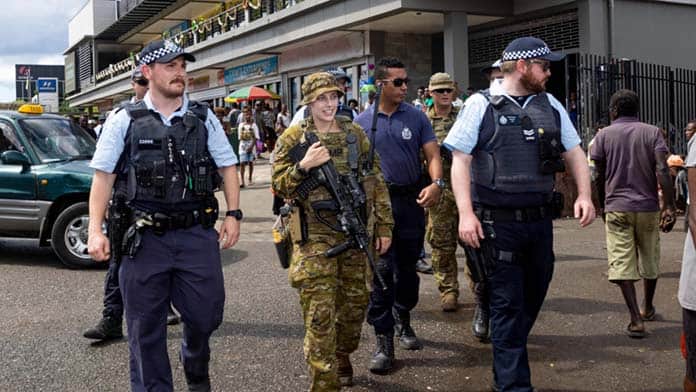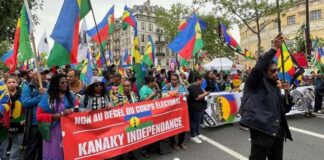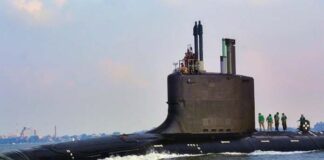With the 20th anniversary of Australian intervention in the Solomons this month, Michael Wesley’s book, Helpem Fren: Australia and RAMSI, is a useful addition to our knowledge of how Australian imperialism works in the region.
The 2003 Regional Assistance Mission to Solomon Islands (RAMSI) had its roots in the Asian economic crisis of 1997-98, which fractured the Solomons state machine along “ethno-island” identity lines between Guale and Malaitan, the two main island groups.
Solomons politicians mobilised people on the basis of those identities to shore up a power base for themselves as the economy nose-dived.
Wesley, wrongly, writes that it was the other way around, that “gangs had links to government ministers … abetted by MPs” who were “willing to channel communal anger at the state”.
This absolves the rulers of the Solomons and blames ordinary people for the crisis.
As an intelligence officer in Canberra, Wesley gives an insider’s view of how and why the John Howard government made the decision to intervene in the space of a few months in early 2003.
It was a sharp volte-face from the previous orthodoxy, which favoured a more hands-off approach, opposing any large scale commitment of Australian military or state personnel and sensitive to accusations of “neo-colonialism” and trampling on island nations’ sovereignty.
Alexander Downer, the Foreign Minister, had defended such a hands-off approach as late as mid-February. As Wesley writes, “And yet, as with all orthodoxies, there were heretical views” based on different policy options.
Wesley writes, “Even within the core departments [Prime Minister and Cabinet, Foreign Affairs and Trade, Defence and AusAID] there were officials who were convinced that the established approach wasn’t working, and who were chafing at the self-imposed policy constraints.”
Cynical process
The official justification was that the Solomons risked becoming a “failed state” where terrorists or criminal networks could operate freely.
With access to former Prime Minister Howard, Downer and a host of Defence and Intelligence agency operatives, Wesley lays bare the quite cynical process of Australian imperialist intervention into the Solomon Islands.
The aim was to prop up a “dysfunctional” state machine in the interests of Australian national and strategic interests and had very little to do with the humanitarian needs of the people of the island group.
The Australian government has always sought to protect its interests in the region. But initially the Howard government sought to limit Australian intervention in line with what Wesley calls the orthodoxy of Australian policy in the southwest Pacific.
It ended up brokering a peace deal on Bougainville, after initially following the previous Labor government’s efforts to fund the Papua New Guinea army in crushing a secessionist uprising there triggered by Australian mining development.
The East Timor crisis of 1999 did see Howard send in thousands of troops, but only after it was clear Indonesia was withdrawing and he saw no other option. Australia only arrived after Indonesian militias had run rampant, destroying thousands of buildings and killing 1400 people. Although this was no humanitarian mission the Australian left’s enthusiastic support for it strengthened Howard’s hand for future regional interventions.
Following coups in the Solomons in June and in Fiji in July 2000, Howard sought to assert Australia’s authority in the Pacific Island Forum (PIF).
The late Greg Urwin, a Canberra career diplomat, crafted the Biketawa Declaration, which was adopted by PIF leaders in October 2000. The Declaration was designed to see the PIF co-ordinate a response to future regional crises.
Later, in 2004, Urwin became PIF Secretary-General in defiance of PIF convention after Howard threatened to withdraw Australian aid, something Wesley fails to mention.
But in 2000 the Australian government was still reluctant to send armed personnel to the Solomons.
Policy advice
In 2001, Howard set up the Australian Strategic Policy Institute (ASPI) as a fully-funded government think-tank supported by the Defence Department. Its role was and is to give strategic policy advice outside the usual sources within the public service.
Its first director, Hugh White, is a creature of that bureaucracy, a career public servant under both Labor and Liberal governments, but sometimes a thinker outside the square.
Yet he shares a common aim with the Defence establishment of advancing the imperialist interests of the Australian ruling class.
As author of the Defence White Paper of 2000, he argued that Australia must maintain “a self-reliant defence force”, “retain control of its maritime territories” and “seek to attack hostile forces as far from our shores as possible”.
In 2002 he went on to author another document, alongside Elsina Wainwright, justifying Australian military and police intervention in the Solomons called Our Failing Neighbour (OFN).
The two authors laid bare, in quite blunt terms, Australia’s place as a sub-imperialist power and its relationship to US imperialism.
“We have security interests in many parts of the globe, but only in the Southwest Pacific are they our interests alone. Only in the Southwest Pacific do we have to take the lead in helping these island states. If we do not, others might move in to exploit the situation, to our detriment.”
Superpower
There are three parts to this statement.
Australia looks to the global superpower, the US, to protect its interests around the globe because Australia’s military is too small to do so. Australia has an economy ranked 12th in the world but a military ranked 19th.
Just some of Australia’s global interests are as follows. BHP has 22 mining and petroleum sites in Australia and another 30 spread all over the world.
Australia’s second biggest mining company, the joint Anglo-Australian Rio Tinto, has mines, smelters and refineries in 35 countries.
Visy, the packaging and recycling company, now operates 180 plants and warehouses in the US, China, Malaysia, Thailand and Vietnam.
In the Southwest Pacific region, Australia directly asserts its sub-imperial control, as Wesley outlines in a set of examples in his historical “lineages”. As Edmund Barton, Australia’s first prime minister, said, “To be pacific, we want the Pacific.”
Early in OFN, White and Wainwright speak of, “The permanence of Australia’s strategic interests in the pattern of islands that punctuate the approaches to our island continent.”
The Solomons, like all the north-eastern island groups, are important because of their “geographical proximity” while “Australian security” depends on the ability to control “the islands across our northern approaches”.
Strategic denial
Finally, the fear that “others might move in” is part of the long-held, historical policy of denying any competing power a presence in the region. As a Victorian MLA declared in 1884, the aim is that “The other nations of the world shall not obtain territory contiguous to the coast of Australia.”
Wesley writes approvingly of the Solomon Islands High Commissioner to Australia, Milner Tozaka, and his role in getting the Solomons Prime Minister Allan Kemakeza to write to John Howard requesting Australian intervention in April 2003.
Nowhere in his book, however, does Wesley reveal that Tozaka told SBS TV that he held talks with an Indonesian government representative, Imron Cotan, in Canberra in April and May.
Tozaka reported back to the Solomons government that Indonesia was considering sending troops to the Solomons, if requested.
There is no doubt that Australia would have gathered intelligence and known of both the meetings and the report back to the Solomons government.
The Solomons Opposition Foreign Affairs spokesperson, Alfred Sasko, said Solomons officials met with Indonesian officials in Bali in April.
Howard’s haste in withdrawing Australian troops from Iraq and the speed of the decision to send in troops to the Solomons, after years of doing nothing, points to a policy of “strategic denial” against Australia’s rivals in the region.
For the intervention, the Australian Government wanted three “threshold conditions” to be met: an invitation from the government of the Solomons, endorsement from the PIF and the inclusion of military and police contingents from PIF nations.
The last condition was a fig leaf to mask that Australia would provide and lead the bulk of the 2500 troops and 250 police officers.
Kemakeza agreed to the first condition, although Wesley reveals he ended up being taken aback when Howard informed him that Australian ambitions went beyond the simple restoration of law and order.
Howard insisted the intervention address the Solomons’ broader economic and governance weaknesses.
On 30 June, the 16 PIF nations met in Sydney and approved RAMSI, agreeing to add their own military and police contingents.
After the decision had been approved in Cabinet on 25 June, Howard informed the Opposition Leader Simon Crean, who gave Labor’s support.
Earlier in the year, and the year before, there had been bitter parliamentary debates about the invasion of Iraq, with Labor opposing the decision to join the war.
But the intervention in the Solomons had bipartisan support—and far less public opposition.
Infinite money
One of ASPI’s documents quoted the Roman politician, Marcus Cicero, “The sinews of war are infinite money.”
The first year alone RAMSI was estimated to cost $300 million. Howard committed to re-building the Solomons state machine over a 10-year period at the cost of $450 million. In the end, over 14 years, RAMSI would end up costing more than $2.6 billion, more than five times the original estimate.
Wesley, rightly, ends the book on a pessimistic note, “Those in charge became steadily became more pragmatic about what they would be able to achieve.”
In 2022, ASPI was forced to admit that despite the cost Australia’s intervention “did not solve the underlying problems”.
Even an Australian Federal Police Assistant Commissioner, Ben McDevitt, central to re-building of the Solomons state machine—he became the Solomons Police Commissioner—admitted in October 2013 that the third phase of RAMSI was difficult, saying “The back end of nation building is always harder than the front end.”
Wesley’s book is a timely reminder of what Australia’s own imperialist interests are and the limits to its power.
By Tom Orsag
Helpem Fren: Australia and RAMSI
by Michael Wesley,
Melbourne University Press, $40






